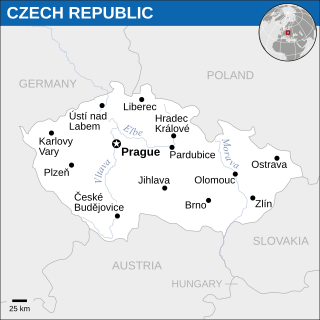More languages
More actions
| Czech Republic Česká republika | |
|---|---|
Motto: Pravda vítězí "Truth prevails" | |
 | |
| Capital and largest city | Prague |
| Official languages | Czech |
| Demonym(s) | Czech |
| Dominant mode of production | Capitalism |
| Government | Unitary parliamentary republic under a dictatorship of the bourgeoisie |
• President | Petr Pavel |
• Prime Minister | Andrej Babiš |
| Area | |
• Total | 78,871 km² |
| Population | |
• 2024 estimate | 10,900,555 |
| Currency | Czech koruna (CZK) |
| Calling code | +420 |
| ISO 3166 code | CZ |
| Internet TLD | .cz |
The Czech Republic, also known as Czechia or historically as Bohemia, is a landlocked country in Central Europe. It is bordered by Austria to the south, Germany to the west, Poland to the northeast, and Slovakia to the southeast.
Until the 1989 counterrevolution Czechia was a part of the Czechoslovak Socialist Republic, a socialist republic which it shared with neighbouring Slovakia. However, modern Czechia is a staunch supporter of imperialism and is part of both the European Union and NATO.
History[edit | edit source]
Kingdom of Bohemia[edit | edit source]
See main article: Kingdom of Bohemia (1198–1918)
In 1526 the Czech feudal lords elected a Hapsburg to the throne, allowing Austria to gain influence over the state which in 1620 culminated in Bohemia becoming a hereditary possession of the Hasburgs. From then until independence in 1918 following Austria's defeat in the First World War, Bohemia was an integral part of the Hasburg lands. It remained a Kingdom inside Austria following the establishment of the Austrian Empire and when the Dual Monarchy was created in 1867 it became part of Cisleithania, the Austrian part of the Empire.[1]
Czechoslovakia[edit | edit source]
See main article: Czechoslovak Republic (1918–1938)
Socialist period[edit | edit source]
See main article: Czechoslovak Socialist Republic (1948–1990)
Post-counterrevolution[edit | edit source]
A 1989 survey in Czechoslovakia found that 47% wanted a state controlled economy, 43% wanted a mixed economy whilst only 3% favoured capitalism, but this did not prevent the introduction of capitalism in 1989. Following the fall of the communist government Václav Havel became president, and wasted no time in privatizing state assets, introducing free market reforms, and repressing the people. Between 1989 and 1995 in Czechia, nearly 80 percent of all enterprises were privatized whilst industrial production shrank by two-thirds. The Czech ruling class also swiftly became a willing participant in western imperialism; selling weapons to fascist regimes in Chile, Thailand and the Philippines whilst eagerly joining the United States' Gulf War.[2]
Politics[edit | edit source]
In 2020 the far-right anti-immigration Freedom and Direct Democracy Party held 22 of 200 seats in the Chamber of Deputies. It has connections to Marine Le Pen's National Rally in France.[3]
A 2025 law signed by Czech president Petr Pavel amended the Czech criminal code to apply a law banning Nazi propaganda to ban promotion of communism as well, with sentences of up to five years in prison as a punishment.[4]
References[edit | edit source]
- ↑ V. D. Koroliuk, G. E. Sanchuk, K. P. Gogina (1979). The Great Soviet Encyclopedia: 'Czechoslovakia'.
- ↑ Michael Parenti (1997). Blackshirts and Reds.
- ↑ Ellen Rivera, Marsha P. Davis (2019-07-22). "Dissecting Identity & Democracy: the EU’s new far-right super group" CovertAction Magazine. Archived from the original on 2020-09-21. Retrieved 2022-11-23.
- ↑ Aneta Zachová (2025-07-18). "Czech president signs law criminalising communist propaganda" Euractiv. Retrieved 2025-08-13.


